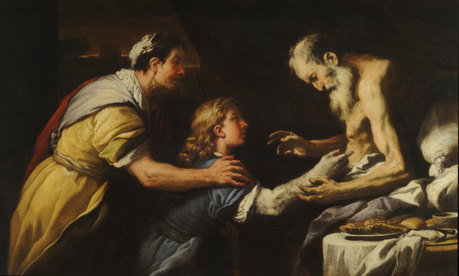 Luca Giordano's "The Presentation of Jacob to Isaac"
Luca Giordano's "The Presentation of Jacob to Isaac" But there is another way of looking at the Bible's imperfect heroes. We might ask, "Even if a human being could be perfect, would it be possible to behave perfectly in such an imperfect world as ours? What would flawlessness even look like in a reality that sometimes leaves us with no good choices?" We may actually come to the conclusion that to be a truly righteous person in this flawed world, one must adopt behaviors that appear to be unrighteous.
In this week's Torah portion (Toledot), for example, we see the patriarch Jacob behaving in ways that seem morally questionable. He deceived his father Isaac and cheated his brother Esau out of his birthright. Yet, it can be argued that Jacob's deceit served a higher purpose and was actually righteous. His father Isaac, after all, was blinded by his fears and his carnal appetites. If left to his own devices, he would have made a terrible decision. Esau, Jacob's brother, was manifestly unfit to be a leader of God's people. Jacob stole the birthright from him because it was what was necessary to secure the future of his people and to allow God's will to be realized.
So then, why does Isaac say that Jacob acted "with guile" (b'mirmah, Gen. 27:35) in deceiving his father and stealing from his brother? It does not sound like a word you would use to describe the behavior of a righteous person. It is the same Hebrew word that Amos used to describe the dishonest scales and weights that the wicked use to cheat the poor (Amos 8:5). Not very nice.
But, in the case of Jacob deceiving his father and stealing from his brother, Rashi says (following the translation of Onkolos) that the word "guile" actually means "wisdom." Sometimes, in this world, to act with guile – even with treachery – is the path of wisdom.
A story about Rabbi Avraham Yehoshua Heschel of Apt (the great-great-grandfather of the 20th century rabbi of the same name) illustrates this point. The story (told in Aharon Yaakov Greenberg's Itturei Torah, 1:240), says that there was once a dispute in the town of Apta between two esteemed families. The families brought the dispute to Rabbi Heschel and he ruled in favor of one of the two families. After that, the family that lost the dispute began spreading gossip saying that the rabbi was corrupt. The gossiping got so bad that some said that the integrity of the whole town was questionable because of the corruption of its rabbi.
Rabbi Heschel did not defend himself or argue against the charge of corruption. Rather, he stated plainly, "Truly, this is a place of error." However, he said, the real test of truth is not in the way things seem on the surface.
"The real vision of truthfulness," said Heschel, "is the vision demonstrated by the patriarchs – but not that of Abraham, the man of faith, and not that of Isaac, who was willing to sacrifice his own life. It cannot be them. Rather, it is the vision of Jacob who stole the birthright from Esau for a pot of lentils, who tricked his father into blessing him, and who outwitted Laban. It is precisely he who is praised for truthfulness by the prophet who said, 'You shall give truth to Jacob' (Micah 7:20). We must be blessed with the most subtle discernment to understand where truth is."
What was Rabbi Heschel trying to say? It seems that to be able to see the truth in this confusing and muddled world requires all the cleverness of a con man, the guile of a trickster. It is Jacob who is the paradigm of truth because it is he who has the craft to cut to the essence of impossible situations in which there are never black and white answers, only shades of gray. It requires skill to discern where, amongst the gray choices of reality, the truth is best to be found.
Rabbi Heschel began his answer by saying, “Truly, this is a place of error.” It was not just a clever rhetorical flourish to answer a false charge of corruption. He was talking about something bigger than just the town of Apta. In Heschel's response, “this place” is really the world. Our reality is not a place where the truth is obvious to any person of simple faith and earnest devotion (like Abraham and Isaac). Rather, in “this place,” filled with error, we are forever searching to find the best answer to life’s tests without ever being able to be certain that we have hit upon “the truth.”
And, there is an important lesson here, also, about the nature of forgiveness and self-forgiveness. We often are quick to judge others and, even more, ourselves, for failures in judgment. We imagine that there is some ideal solution to any given problem we may face in life. The real truth is that this is an illusion. Most of life’s most important challenges – how to deal with the conflicts within families, communities, friends and foes – don’t have any black and white answers.
Often, the best we can hope to do is to use all of our skill to come up with clever solutions that do the most good and the least harm. It is good to be good, but sometimes it is just as important to be clever. As Rashi taught, guile really can be wisdom in another form.
Instead of criticizing others and ourselves for not dealing with life’s difficulties in the “perfect” way, we should practice forgiveness and recognize that we are all just doing the best we can in an a world filled with uncertainty and imperfection.
Other Posts on this Topic:
Noah: The Redemption of God
Vayakhel-Pekudei: Being a Dwelling for God


 RSS Feed
RSS Feed
